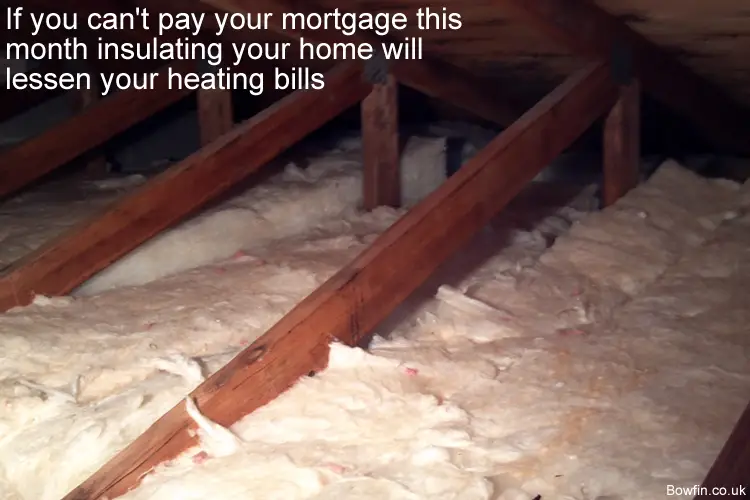
It’s only when you’re in arrears that you realise you don’t really own your home if you have a mortgage secured on it. You soon find out that it’s really the mortgage lender who owns your home when you miss a mortgage payment. But what do you do if you can’t pay your mortgage this month? Let’s take a look…
What to do if you can’t pay your mortgage this month – steps to take
If you can’t pay your mortgage this month you need to inform your mortgage company as soon as possible. But if you’ve already missed a mortgage payment you are now ‘in arrears‘. If you’ve not already spoken with your mortgage lender, you need to do it as soon as possible.
The sooner you engage with your mortgage lender the better. Communicating with your bank is probably the most important first step to help you get you back on track with your mortgage payments.
Depending on where you are in the month, will depend on what steps you can take if you can’t pay your mortgage this month. Your first step to take will be different if you are close to when your mortgage payment is due to be taken by direct debit vs if it’s several days away.
But let’s take a look at what you might be able to do if you can’t pay your mortgage this month.

- Communicate with your mortgage lender.
- Change the timing of your monthly mortgage payment.
- What other bills or payments could you delay.
- Look to see what payments or services you can cancel altogether.
- If you’re employed, ask your employer for an advance, but this comes with a warning!
- Ask your family or friends for a short term loan, but this comes with a warning!
- Apply for a short term loan, but this comes with a warning!
- Ask for a change to the terms of your mortgage with the same lender.
- Switch mortgage lender.
- Is it time to move…is your home too expensive to live in?
1. Communicate with your mortgage lender

Depending on how the other suggested steps are relevant or indeed possible, will affect your decision about when, if or whether you contact your mortgage lender. But always have this step on your radar when you are struggling financially.
Whilst mortgage lenders will penalise you for not paying your mortgage payment on time or if you miss a payment altogether, they will be willing to help you to sort your problem out. But the sooner you’re able to speak with your bank, the better.
If you want to protect your credit report with the credit rating agencies, you need to avoid missing a mortgage payment and falling into arrears.
More Reading: How long does a house repossession stay on your credit report UK
2. Change the timing of your monthly mortgage payment
One thing you may be able to change is the time in the month when your mortgage payment leaves your bank.
When you first set your mortgage up, you were probably asked this question. If you opted for the start of the month, you may be able to ask your bank to delay the payment towards the middle or end of the month.
This may buy you enough time to get the necessary funds together to be able to afford the mortgage payment this month. However, mortgage payments are taken by direct debit. These need time to be changed and you may find it’s not possible to change the timing at short notice.
But what you could do is inform your mortgage lender that you’re going to cancel the direct debit, but then make a manual payment instead. So long as you communicate with your lender this should be okay.
Plus so long as you still make your payment on time you won’t go into arrears. This won’t affect your credit report either, assuming you’ve not already missed any mortgage payments before. But check payment timings with your mortgage company first.
3. What other bills or payments could you delay

Knowing that your mortgage is the most important payment to keep up with on your home is key to sorting this problem out. If you get into arrears on your mortgage and are not able to sort this out with your bank, you may face repossession.
More Reading: Home repossession process in The UK (When is it too late to stop it?)
You need to check what other standing orders or direct debits are to leave your bank account between now and when your mortgage payment leaves your bank.
Whilst I don’t want to encourage you to miss other payments, but missing certain types of payment won’t affect your credit report in the same way a missed mortgage payment will.
More Reading: How long does a missed mortgage payment stay on your credit in the UK
You may be able to come to an agreement with the other bill payments you need to make. For example, one large payment that most have to make as a home owner is council tax. You may be able to agree with your local council a payment plan to cover any missed payments.
You could change the timing of these other standing orders or cancel them altogether and manage the payments yourself.
Not all payments types affect your credit report in the same way as missed mortgage payments do. But if you end up not paying these debts at all, this will end up on your credit report, so be careful how you manage this process.
More Reading: How Many Months Mortgage Arrears Before Repossession in the UK
But be careful you don’t end up getting yourself into a mess. Plus always speak with each of the organisations first, before changing or cancelling a direct debit or standing order instruction.
4. Look to see what payments or services you can cancel altogether
When you face the question “what to do if you can’t pay your mortgage this month“, it’s time to review your monthly out goings. If you are with a partner and you share the bills etc. it’s time to sit down, set a budget and cull some costs.
This is a list of things to you need to review:
- Take a look at how much food you’re throwing away each week or month. Plan your food shopping more carefully and always go to the supermarket with a list. Or change to shopping online.
- Take a look at what brands of food or clothing you’re buying. What you buy doesn’t need to have a label or top brand label to be good. Cutting out top brands and labelled fashion cloths could save you a fortune!
- List out all of the direct debits and standing orders going out of each of your bank accounts. Make sure that you are fully utilising the services you are paying for. If not cancel the service and the direct debit or standing order accordingly.
- How often are you eating out or getting takeaways? Perhaps you could cut down on this and eat at home instead. But start to cook instead of having a takeaway meal.
- What car do you own and drive? Is it time to get a cheaper and more fuel economic car to save money.
- Review your credit cards and the payments you’re making on these each month. Review what interest your are paying on these. Consider a consolidation loan where you’re paying high levels of interest in your credit cards.
- Review your utility costs and see where you can make changes to save money.
The sooner you review what you are spending and the quicker you manage to cut out unnecessary spending the better. You may not be able to do this in time to meet this month’s mortgage payment, but it may help future payments.
If you can’t pay your mortgage this month insulating your home will lessen your heating bills

By reviewing your utilities, and in particular your heating costs, may highlight where you’re wasting money. Consider better insulating your home.
Whilst this may cost you, there are many home insulation grants available which may make it free to insulate better.
Cavity wall insulation for example, can make all the difference to your heating bills and can be free to install. This is not a short term fix to an immediate problem of not being able to afford your mortgage this month, but this will go to help saving money in the future.
5. If you’re employed, ask your employer for an advance – but heed the warning
So long as the mortgage payment shortfall is short term and a short term loan would help, you could ask your employer for an advance. This may be enough to afford this month’s mortgage payment and allow you to work on some of the other steps suggested in this article. Which in turn may help towards future mortgage payments.
The warning!
This step does come with a warning. The warning is to make sure you’re not getting yourself into a further mess. But also, please make sure you use this step in conjunction with other steps in this article. For example, cutting out unnecessary expenditure.
But make sure that what you borrow from your employer you can afford to pay back. The last thing you want to happen is to not repay your employer and cause problems with your only source of income.
6. Ask your family or friends for a short term loan, but this comes with a warning
Your family of a friend may be able to help you with your mortgage payment. But as with the previous step, make sure by doing this you don’t get yourself into a further mess. But also ensure you take other steps to reduce your monthly costs.
Additional warning
When it comes to borrowing from family or friends, this always comes with a health warning. The quickest way to fall out with family or friends is to not repay a loan. Make sure you have agreed payment terms and whether interest will apply or not.
Make sure you stick to the payment plan agreed. This way, if you ever need a loan again, your family member or friend are more likely to oblige again.
But if you don’t pay on time or as per the agreed payment schedule, you’re unlikely to get a future loan.
Always remember this, you can always treat someone badly the first time, but there usually isn’t a second opportunity to do the same. But if you always treat people kindly and with the respect they deserve, you’ll command their respect forever.
7. Apply for a short term loan, but this comes with a warning!

There’s nothing to prevent you from applying to your bank or other lender for a loan. This could be an unsecured loan or one that is secured on your home with a second charge.
But before you go down this route, be careful that you’re not getting yourself into more debt unnecessarily. You don’t want to be going on a downward spiral and be out of control.
You may be better to seek some free and impartial advice from the likes of Step Change Debt Charity. But do this before you begin adding more debt.
Make sure you work out a budget of what you can afford on a monthly basis. There’s no point in borrowing more and adding to your outgoings when you can’t afford what you have now.
Before you borrow you need to be looking at what savings you can make. These savings need to at least equal the additional monthly loan repayment. Otherwise you’re simply living on borrowed time.
The only reason to borrow, which applies to the other forms of borrowing explained above, is as a quick short term fix only.
Only use loans in conjunction with fixing the other problems and saving money.
The same warning applies with this step as before. Do not borrow more money if you don’t think you will be able to meet the repayments.
8. Ask for a change to the terms of your mortgage with the same lender
Going back to the communication with your lender, one of the options open to you is to seek different terms. This would be easier to achieve before you get yourself into arrears. But also, changing your mortgage payment terms isn’t always a quick and easy fix.
You may need to buy yourself the time whilst your mortgage company considers your application to switch to a different mortgage product. Switching product with the same mortgage lender will be quicker than completely switching mortgage companies.
This begins by speaking with your bank and asking them what options they have to help you afford your next monthly mortgage payment.
The types of change to a mortgage you may be able to seek:
- An interest only mortgage. But make sure if you change to this type of mortgage you change it back when you can afford to, as you’ll need to eventually repay what you owe.
- Extend the term of your mortgage. The amount of time you can extend may be affected by your age. But if you are able to extend the term, this will reduce your monthly mortgage payments.
- Ask for a repayment holiday. Your mortgage lender might be willing to offer you a repayment holiday. This means you’d have a break from paying your mortgage for a few months. You’ll need to catch up with these payments before your mortgage term ends.
9. Switch mortgage lender
Whilst it’s easier and quicker to change mortgage products with your existing lender, this doesn’t prevent you from trying other banks. However, if you are already in arrears with your mortgage, you may find it difficult to find another mortgage provide willing to lend.
If you are thinking about switching mortgage lenders, do so before you get into too much difficultly. I would also always recommend you speak with a mortgage broker.
By doing so will cost you an extra arrangement fee, but they will look at the whole of the market for products to suit your situation and what you’re trying to achieve.
10. Is it time to move…is your home too expensive to live in
Whilst moving home in itself isn’t cheap and isn’t a quick fix, it does remain an option where you’re struggling to afford your mortgage payments.
More Reading: What to do if you bought a house you can’t afford (7 top tips)
If you are able to downsize, this might be the best option. Alternatively, if a smaller house won’t work for you and your family, you could always move to a cheaper area where the same size house is less expensive. This will in turn reduce your monthly mortgage payments.
However, as already explained, if you are already in arrears on your mortgage, your credit report will already be badly affected. Moving house and applying for a new mortgage needs to be done before you miss any mortgage payments.
More Reading: Can you sell your home if you are behind in mortgage payments?
Who can help with mortgage arrears?
If you are struggling to afford your mortgage, there are a number of agencies who are there to help. If you’ve not yet contacted your mortgage lender, one of these debt agencies will provide helpful advice of how to make this approach.
It will also add real weight to your case if you’ve used one of these agencies. Plus if you find yourself in court over a repossession, this is extremely helpful to prove you’ve been actively trying to sort the problem out. It may even be enough to prevent a court from issuing a repossession.
More Reading: How To Avoid Repossession Of Your Home (Help Is Available)
The main agencies include:
- StepChange Debt Charity website or call 0800 138 1111. A free debt help service.
- National Debtline website or call 0808 808 4000. A free debt help service.
- Citizens Advice website or your local CAB centre. A free dept service.
- Debt Advice Foundation website or call 0800 043 4050. Free confidential debt advice from a UK charity.
- Christians Against Poverty (CAP) website or call 01274 760720. Free debt help.
Perhaps in conclusion it might be time to also review your income. Is it time to speak to your current employer about a pay rise or promotion. Or is it time to consider a move to a fresh job which may come with an increased pay package.
But don’t hesitate, do a budget now to organise your money. A budget will help you to review both your income and outgoings each month. A buget helps to focus the mind!
I hope this article has helped on what to do if you can’t pay your mortgage this month
If this article has helped on ‘what to do if you can’t pay your mortgage this month’ please share it on your favourite social media site.
Also, if you have any questions or you need help, please feel free to comment below too. Alternatively, if you need more help, please feel free to contact us on our contact us page here. Or join the discussion and ask your question in the property forum.




